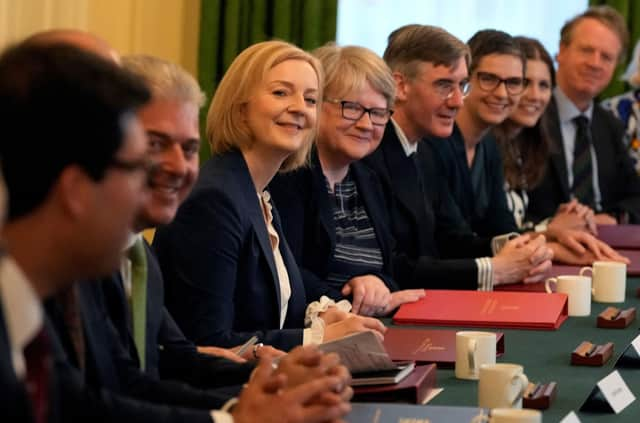How Tory ideological excesses have led to UK's ethical and financial meltdown – Joyce McMillan


It was passed on by a friend who had recently spent time on a European river cruise, where he and his partner met another Scot with very traditional unionist views. And one night over dinner, as they chugged along through Austria and Slovakia, this man said, “They tell us that these countries are poor, don’t they? But look at them; they’re doing better than us.”
It’s a tiny sentence that contains a whole world of strangeness, for those who are broadly pro-European, and who have long taken for granted the relative prosperity of most EU member states.
Advertisement
Hide AdAdvertisement
Hide AdYet somewhere in British culture, the belief persisted that we were the big, well-off trading nation on this continent, and the others were somehow lesser. It was fully exposed during the Brexit campaign, which portrayed the EU as a set of chains restraining glorious old ‘global Britain’, rather than as the basis of the trading relationships that had sustained the country since the postwar end of Empire; and just three weeks ago, following the death of Queen Elizabeth, it was given another spectacular boost, in 11 days of mourning surrounded by constant exceptionalist rhetoric about Britain’s special status, as a nation still capable of staging dazzling displays of imperial pomp and splendour.
Students of history, though, will not make the mistake of confusing such displays with the real substance of economic and political strength; and since then, a series of seismic economic events have begun to make clear to us the extent of the economic crisis the UK now faces.
In a sense, of course, most ordinary British citizens will not need to be told how profound the current crisis is. Against a backdrop of declining real incomes, the current perfect storm of soaring food and energy prices – now with the added twist of likely mortgage payment hikes, question marks over the security of pension funds, and a rapidly weakening currency – has brought tens of millions to a point where household budgets simply cannot be balanced.
It’s still the British way, of course, to personalise these problems, rather than politicising them; and people sinking towards poverty often tend to feel ashamed of their situation, rather than angry.
In truth, though, a glance at the global statistics shows that Britain’s economic decline is real, and that the disastrous Brexit decision of 2016 has made matters measurably worse.
In 2022, Britain ranks 31st in the world – that is somewhere between Slovenia and Lithuania – in the raw measure of wealth, GDP per capita; and that figure disguises inequalities so extreme that our poorest ten per cent of citizens are already doing worse than in several East European countries.
It has been estimated by Financial Times analysts that the median Polish family will be better off than its British counterpart by 2030; and most critically of all, where in 2016 Britain was the fourth-largest exporting country in the world by dollar value, today – after the Brexit hit against UK exporters – it ranks only 14th.
These statistics, in other words, are utterly damning; and what they damn, specifically, is that nexus of right-wing campaigners and organisations around the British Conservative party which – since the 1970s, but most notably since the financial crash of 2008-2009 – have clung ever more tightly to their ill-fated trinity of political goals: austerity and a shrinking state, Brexit, and denial of the need for action on climate change.
Advertisement
Hide AdAdvertisement
Hide AdAnd it seems that this path of extreme right-wing policy has finally reached its limit in the ridiculous government of Liz Truss, which has now succeeded in alienating even the markets it reveres; thanks to its refusal to raise tax from those – oil and gas producing companies, and wealthy high earners – who can afford to fund the government spending now necessary to sustain household incomes, and to steer the British economy away from midwinter disaster.
This week, a glimmer of light finally appeared in the shape of a coherent and unified Labour party conference in Liverpool, which acknowledged the need for massive investment in renewable technologies and carbon reduction, as the obvious way forward for the British economy in terms of job creation, “green” economic growth, and a viable long-term future.
The party’s electorally driven refusal to confront the negative consequences of Brexit certainly shows how far the UK will have to travel, from its present low point, to rid its political system of the toxic influence of the free-market and post-imperial fantasies that have dominated it for too long.
Yet there is a growing sense that the long hegemony of right-wing Conservative thinking is drawing to a close at last; and despite Brexit, and Labour’s reactionary and ill-informed ramblings about the SNP in Liverpool this week, it seems obvious that in domestic, economic policy terms, the SNP and Labour are now so close together in the social democratic camp that eventually, in this age of mounting crises, some historic compromise between them may become all but inevitable.
As this week’s Scottish Parliament exchanges between the First Minister and Anas Sarwar made clear, after all, both parties are now in full agreement about the roots of the current ethical and financial meltdown, in the Tory ideological excesses of the last decade.
And unlikely though any co-operation may seem now – as Labour strives to win back “patriotic” Red Wall voters, ahead of a UK general election – that basic agreement about the nature of the UK’s recent failures, and about many of the steps needed to remedy them, seems to me like the starting-point for a negotiation that could eventually lead to better times, for all of us in these islands.
Comments
Want to join the conversation? Please or to comment on this article.

